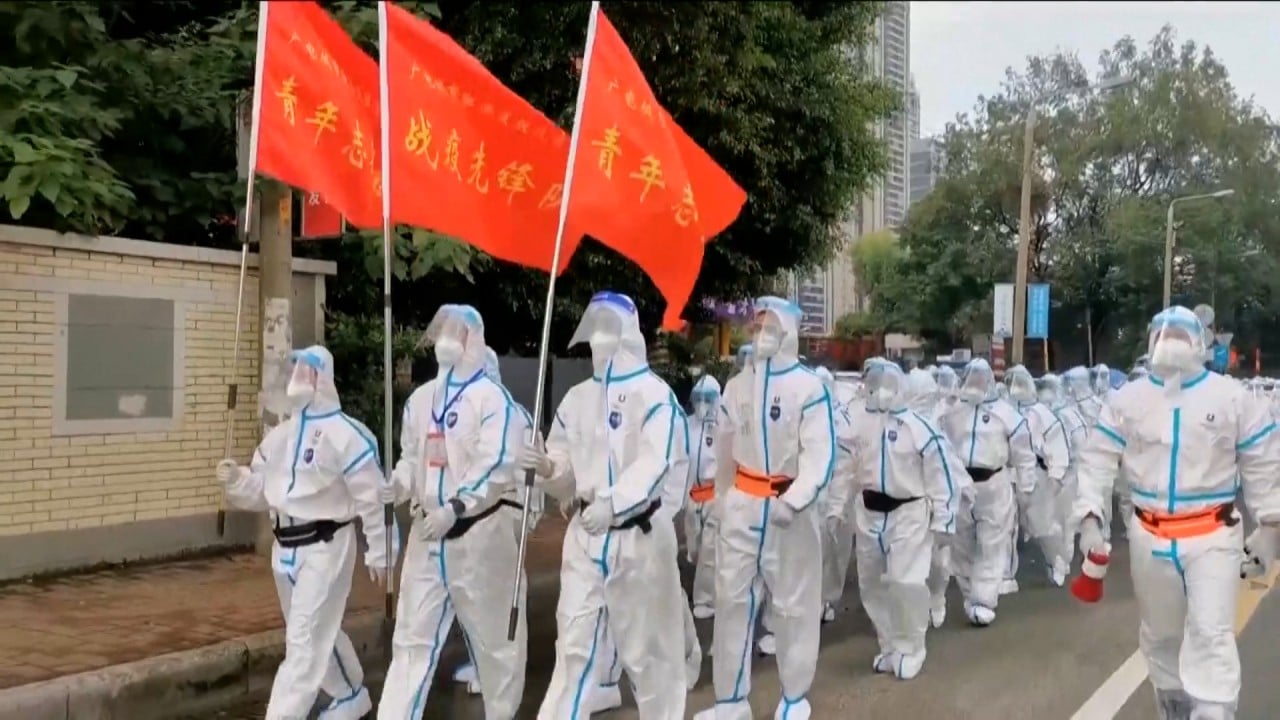
Coronavirus: calls for Hong Kong to tighten rules for returning residents as variant clusters grow over the border
- As neighbouring Guangdong struggles to contain a resurgence of cases, talks on reopening the border with Hong Kong take back seat, mainland official admits
- In Hong Kong, where seven new cases emerged, health experts warn the border crossing scheme for residents presents pandemic risks for the city
The warning came as an official source from the mainland told the Post that plans to reopen the border with Hong Kong would be pushed back even further since the Guangdong government had prioritised its efforts to contain the growing outbreak in the province, given the challenge authorities were facing in tackling coronavirus variants and detect asymptomatic cases.
The Guangdong government official, who spoke on condition of anonymity, said any progress so far in border-reopening discussions would “definitely be affected”, as provincial authorities were busy containing the spread of clusters in the major cities of Guangzhou and Shenzhen with tighter quarantine and lockdown measures.
Four more Covid-19 infections, including one asymptomatic case, were reported in Guangzhou on Sunday, taking the city’s total since May 21 to 98 cases. Mass testing of more than 18 million people, including those screened more than once, has uncovered at least six positive cases over the past three days.
Shenzhen reported one more infection on Sunday.
18 million tests in three days as Guangzhou tries to stem spread in latest outbreak
The mainland official said the Delta variant that was first reported in India and recently identified in Guangzhou was “something totally different” from the strains previously found in the city, rendering ineffective some previous control efforts, such as asking people to stay at least 1 metre apart from each other.
“This is a very different enemy. The variant has a much higher proportion of asymptomatic infections; it is much more infectious, and results in a much higher viral load,” the official said.
“Stopping the spread is the top political priority now. Border reopening will only come after this outbreak is brought under control.”
The situation in Hong Kong also remained worrying as health authorities confirmed seven new Covid-19 cases on Monday, one of them local and six brought in from Indonesia, the United Arab Emirates and the United States.
They took the city’s total to 11,865, with 210 related deaths. Fewer than five people tested preliminary-positive.
The local case involved a 20-year-old woman whose 17-year-old sister was infected with the Alpha variant, first identified in Britain. The Centre for Health Protection said the older woman was carrying the N501Y mutation found in the variant. Their mother was the sole local case on Sunday, likely to be carrying the same variant.
As the mainland struggles to stamp out clusters, the Hong Kong government scheme allowing residents to cross back home over the border without undergoing quarantine has come under greater scrutiny. Medical experts cautioned that the “Return2HK” scheme needed to be tightly monitored or cases could seep into the city undetected.
Professor David Hui Shu-cheong, who advises the government on its pandemic response, said authorities should ensure returnees strictly adhered to the mandatory testing schedule after their arrival. Currently, they must submit specimens on the third, fifth and 12th day after entering.
“The government must enforce the law and penalise those [who do not follow the rules],” Hui said. “The [testing] measure is important, as hidden transmission could be brought over if there were missed cases.”
Authorities have issued 33 orders to returnees who did not follow the testing schedule since the launch of the scheme in late November last year, and they risked a HK$5,000 (US$645) fine.

02:11
Guangzhou tightens Covid-19 controls as mass tests expose more cases in Chinese city
Another challenge comes from the constantly evolving map of locations on the mainland that are reclassified as presenting an elevated risk of the coronavirus. Hongkongers might depart from an area deemed low risk and be allowed to skip isolation upon entry after providing a negative Covid-19 test but the same location might later be categorised as higher risk, which would then require they undergo quarantine.
“If a particular area has a higher outbreak risk, it is necessary to extend the quarantine arrangement retrospectively to those who had been to those places in the past 14 days,” said respiratory medicine expert Dr Leung Chi-chiu.
Neighbouring Macau already requires anyone who had visited a mid or high-risk area on the mainland in the past two weeks to undergo medical surveillance at designated locations.
Leung said Hongkongers coming from places with cases of Covid-19 variants should be placed under 21-day quarantine at specific hotels, as arrivals from countries where variants were more prevalent must do. Hong Kong authorities currently list 17 places in Guangdong and one district in Luan in Anhui as mid or high risk.
Taiwan prolongs Covid-19 measures and reports 214 new cases, 26 deaths
Health experts have also urged authorities to widen their efforts to trace the source of the recent local infections of the Alpha variant, warning the next two to three weeks would be critical in determining whether the city was at risk of a fifth wave.
Dr Gilman Siu Kit-hang, an associate professor at Polytechnic University’s department of health technology and informatics, suggested comparing the 17-year-old girl’s genome sequence with the variant recently elsewhere in Asia, such as Indonesia, Japan and Taiwan, to narrow down the transmission possibilities.
“Once we know which [place] the case is linked with, we can look into similar recent imported cases in Hong Kong and conduct genome sequencing to trace back the source of the infection,” Siu told a radio programme.
The Department of Health said it was still comparing the genome sequencing of the local cluster of the variant cases with those of recent imported ones carrying the same mutation.



